|
|
|
Sort Order |
|
|
|
Items / Page
|
|
|
|
|
|
|
| Srl | Item |
| 1 |
ID:
134077
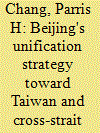

|
|
|
|
|
| Publication |
2014.
|
| Summary/Abstract |
For almost a decade, Beijing has pursued a "soft" approach toward Taiwan, cultivating economic ties and political exchanges in its pursuit of reunification. Following the end of President Chen Shui-bian's term in office, which was marked by constant tensions and several crises with China, Beijing has colluded with his successor, Ma Ying-jeou to pursue a policy of economic integration with the mainland. Beijing's
strategy toward Taiwan under Chairman Xi Jinping and his predecessor Hu Jintao has yielded positive results. The approach not only avoids possible military conflict with the United States, but receives support from Washington. Beijing's economic means, such as the Economic Cooperation Framework Agreement (ECFA), have enhanced Taiwan's economic integration with China and greatly increased the
PRC's control over Taiwan's economy and society, helping to lock Taiwan into the mainland's orbit. Likewise, Beijing has developed tools that allow it to intervene directly in Taiwanese domestic politics. However, efforts to use ties with President Ma to bring Taiwan farther into the PRC orbit have backfired, resulting in a weakened presidency that cannot deliver Beijing's goals. Thus, Beijing appears to be looking ahead to the next two elections, trying to make as much progress as possible before Ma leaves office, while simultaneously trying to establish ties with possible successors and the opposition DPP. In 2012, Beijing's intervention assisted the reelection of President Ma. It is sure to try again in Taipei's mayoral election in 2014 and the presidential/parliamentary elections in 2016.
|
|
|
|
|
|
|
|
|
|
|
|
|
|
|
|
| 2 |
ID:
132553
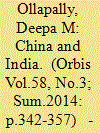

|
|
|
|
|
| Publication |
2014.
|
| Summary/Abstract |
How well do theories of economic interdependence and structural realism explain the India-China divergence between growing economic relations and continuing strategic mistrust? This article looks at the Indian side and argues that we need to go beyond economic and strategic factors, and brings in a more contingent approach based on domestic elite discourse and thinking. The article suggests that a more nuanced and complex debate on China is emerging in India than that posited by interdependence or realism, a debate that is framed by what I term nationalist, realist and globalist schools of thought, with the latter two groups currently holding the center of gravity.
|
|
|
|
|
|
|
|
|
|
|
|
|
|
|
|
| 3 |
ID:
131846
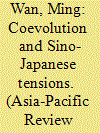

|
|
|
|
|
| Publication |
2014.
|
| Summary/Abstract |
Unlike those who blame the other side or structural forces beyond one's control for the current Sino-Japanese tensions, this paper offers a theoretical insight about the coevolution between China and Japan to explain why the two Asian great powers that had a better relationship in the past are now experiencing greater tensions when their much closer economic and people-to-people ties should facilitate greater cooperation. The two nations have coevolved over millennia with increasing intensity over time. They avoided serious tensions in the 1970s-1990s partly thanks to each being situated in a different niche. But that separation has diminished in a globalizing world and the two countries are becoming more integrated, which has triggered a backlash. The earlier generation of proponents of Sino-Japanese friendship succeeded in forging strong economic and social ties, but the current generation finds it difficult politically and psychologically to manage the new reality in their relations.
|
|
|
|
|
|
|
|
|
|
|
|
|
|
|
|
| 4 |
ID:
130893
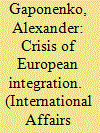

|
|
|
|
|
| Publication |
2014.
|
| Summary/Abstract |
AFTER THE USSR'S COLLAPSE, the Baltic states came under the political influence of the US and the economic influence of the European Union. This influence was used by their new geopolitical "curators" to initiate an anti-Russian line in both the foreign and domestic policies of Latvia, Lithuania and Estonia, as well as to break their economic ties with Russia. At present, the only significant economic ties that Russia still has with the Baltic countries are in the energy sector. It's the supply of natural gas through the pipeline and distribution systems with the use of the Incukalns underground storage facility. It's also the supply of Russian electricity and rail deliveries of hydrocarbons via the Ventspils and Klaipeda ports.
|
|
|
|
|
|
|
|
|
|
|
|
|
|
|
|
| 5 |
ID:
143167
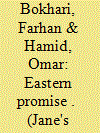

|
|
|
| 6 |
ID:
174308


|
|
|
|
|
| Summary/Abstract |
The Quadrilateral Security Dialogue—the “Quad”—became an official event on 25 May 2007 on the sidelines of the ASEAN Regional Forum meeting in Manila. The interlocutors were a few rungs below the senior-most diplomats.1 But it had originated informally two and a half years before, when Australia, Japan, India, and the United States rallied to coordinate humanitarian assistance in the wake of the 26 December 2004 tsunami that affected the Indian Ocean littoral from western Australia to the Horn of Africa. This quartet was sometimes referred to as the Tsunami Core Group.
|
|
|
|
|
|
|
|
|
|
|
|
|
|
|
|
| 7 |
ID:
087236


|
|
|
|
|
| Publication |
New Delhi, Allied Pblishers, 1986.
|
| Description |
229p.
|
|
|
|
|
|
|
|
|
|
|
|
Copies: C:1/I:0,R:0,Q:0
Circulation
| Accession# | Call# | Current Location | Status | Policy | Location |
| 027059 | 337.54047/MEN 027059 | Main | On Shelf | General | |
|
|
|
|
| 8 |
ID:
144639


|
|
|
| 9 |
ID:
144015
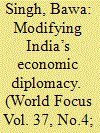

|
|
|
|
|
| Summary/Abstract |
Both the regions had historical and civilizational bonds and enjoyed good economic ties. But these economic ties had frozen on account of colonial dynamics for an extended period. With the breakup of Russia, the Central Asia has emerged on the geopolitical landscape. Since then, both India and Central Asia are having good political relations, but the economic ties including trade and investment are at the lowest level despite the launch of several policies. The Modi government took over the reins in 2014.
|
|
|
|
|
|
|
|
|
|
|
|
|
|
|
|
| 10 |
ID:
135455


|
|
|
|
|
| Summary/Abstract |
This article deals with the new set of agenda in the Middle East and approaches of the Modi government. The Look West Policy of India was under siege of the local political factors. India did not have diplomatic ties with Israel till 1992. But things changed. The realistic approach of foreign policy did come out from the box and became an important part. The new government of India is determined to carry forward the same approach to strengthen India's ties with Middle Eastern countries.
|
|
|
|
|
|
|
|
|
|
|
|
|
|
|
|
| 11 |
ID:
137207
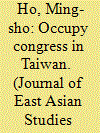

|
|
|
|
|
| Summary/Abstract |
In opposition to a free trade pact with China, Taiwan's Sunflower Movement erupted in spring 2014 and occupied the national legislature for twenty-four days. Drawing from the recent debates on the relation between social movements and the state, I elaborate a revised polity model that focuses on the effects of elite disunity, threat, and movement strategy. The Sunflower Movement originated from a tactical misstep by the ruling party that created an immediate sense of threat from proposed closer economic ties with China, thereby facilitating protest mobilization. Student protesters were able to seize the national legislature because of an internal split within the ruling party and support from the opposition party. However, the failure to further exploit these favorable opportunities exposed the movement to government repression. Fortunately for the movement, the disunity among elites helped the activists manage a dignified exit, which they could claim as a success.
|
|
|
|
|
|
|
|
|
|
|
|
|
|
|
|
| 12 |
ID:
144440


|
|
|
|
|
| Summary/Abstract |
High-level declarations in Moscow and Beijing on the steady progress in upgrading their strategic partnership depart increasingly far from the reality of shrinking economic ties and diverging political perspectives. In late 2014, the dynamic development of this partnership appeared to have the potential of becoming a major shift in the fluid security balance in the Asia-Pacific region; in late 2015, however, the concerned neighbours have more reasons to worry about the deformations in the development of Russia–China relations. President Vladimir Putin and President Xi Jinping are eager to demonstrate perfect personal rapport but their mutual trust is open to doubt and their views on priorities of domestic and international order are in fact strikingly dissimilar. The deep contraction of trade and the lack of interest from Chinese investors propels the Russian leadership towards increasing the emphasis on the security dimension of the partnership, and this makes Russia one of the key sources of instability in the Asia-Pacific region and a challenge to the East Asian peace. It is also entirely possible that the Russian challenge to the stability of the world system would result in strengthening of the key institutions of its governance, thus leaving the revisionist Russia in isolation.
|
|
|
|
|
|
|
|
|
|
|
|
|
|
|
|
|
|
|
|
|